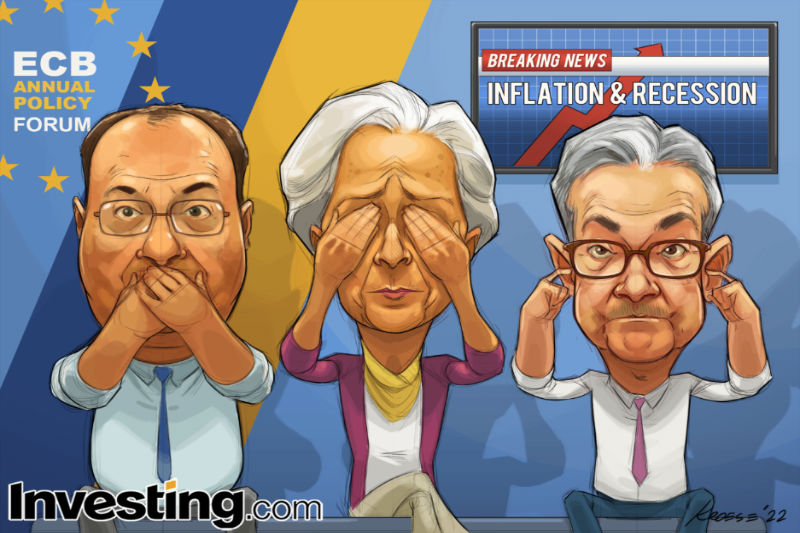Investing.com - Around the world, central banks are in the spotlight in view of high inflation rates and interest rates. However, the path taken by monetary policy is not only causing problems for the economy, but is also putting a strain on the central banks themselves.
The Riksbank (Central Bank of Sweden) will have to apply to the government for a cash injection of more than 7 billion dollars, as Bloomberg reported. This means the institution will have to make up for losses on its balance sheet after the government bonds deposited as assets suffered such a sharp drop in value that it is threatened with inability to act.
The eurozone is still resisting financial injections, but things are not looking good at all, especially at the German Bundesbank. Bloomberg wrote:
"In the eurozone, QE-related losses are being felt most at the German Bundesbank. Still, officials across the euro area are resisting the need for monetary injections, stressing that such shortages are likely to be temporary."
Do they mean the same "temporary" that EZB chief economist Lane used to assess inflation in November 2021?
What is dramatic is that central banks are already in trouble because of their monetary policy at a time when inflation is far from being under control. Marcel Fratzscher, President of the German Institute for Economic Affairs said:
"To be honest, the decline in Inflation, which we have seen, has quite little to do with monetary policy and higher interest rates. We assume, by rule of thumb, that when a central bank raises interest rates, it takes 1.5 to 2 years for the full impact of monetary policy to be felt with falling demand on prices.
The reason for the current decline Inflation is simply that the big shock that came with the war in Ukraine, the exploding energy costs, the exploding food costs, is over and prices are stabilising. At least they are no longer rising so sharply. This has very little or hardly anything to do with monetary policy.
This also shows that the central bank is not all-powerful. It can't just control inflation the way it wants to and it always has to look very much into the future."
According to Fratzscher, the recent pause in interest rates suggests that the ECB believes that the 2 percent inflation target is within reach by the end of next year, which could lead to interest rate cuts as early as the beginning of 2024. But he also warned:
"But it can also turn out completely different if the war in the Middle East escalates, commodity prices shoot through the roof, i.e. oil and gas prices, and we have high inflation again and the ECB has to step up again."
WDR economics correspondent Ulrich Ueckerseifer agrees and also holds out the prospect of Interest rate cuts:
"Interest rates are slowly eating their way through the system and that's why I think it's quite a good idea not to wait too long with the interest rate cuts. We see price pressures coming down, but we also have weak economic growth in Europe as a whole."
But there are also beneficiaries of the current situation, first and foremost the banking sector, as Fratzscher said unequivocally:
"Saving is not yet worthwhile and actually it is a scandal what the banks are doing. They are raking in record profits and earning themselves silly. If you as a consumer want to take out a mortgage for a home or have a consumer loan, the banks now take five percentage points more from you than they did two years ago. But they still don't get anything on savings. That's quite an abuse what the banks are doing there. Many of us don't change banks and therefore there is no competition.
In addition, it is relevant where inflation is. If prices increase by 4.5 percent and I don't get any interest on a savings account, then this asset loses 4.5 percent purchasing power. Advising people to invest in shares now is not a good idea either. The stock markets are still running quite smoothly, which does not fit the recession we have. At the moment it is difficult to give good advice. In the long run, of course, it's always good if you can save, which most people in Germany can't do at all, especially young people."
Besides the banks, there is another big profiteer that inflation plays into the cards, as Fratzscher explained:
"The biggest winner of inflation is the state. The state has to pay more interest on its debts, but it collects much more taxes. According to the latest tax estimate by Finance Minister Lindner, the federal government will collect 7.5 per cent more taxes this year and next year there will be a further increase of 5 per cent.
In the case of food, which has risen by 30 per cent compared to two years ago, the Finance Minister is earning a tidy profit through the value-added tax. In addition, inflation lowers the value of the debt. Inflation is not a losing proposition for everyone."
While Finance Minister Christian Lindner said that the state should not profit from inflation, the solution is far from optimal, Fratzscher said. The Inflation Compensation Act, which relieves taxpayers by 15 billion euros a year by shifting the limits for cold progression, is just window dressing. Most of this money goes to the top earners. People with low incomes, who are hit hardest by inflation, hardly benefit at all.
You can find the complete expert talk here:
Translated from German using DeepL.
